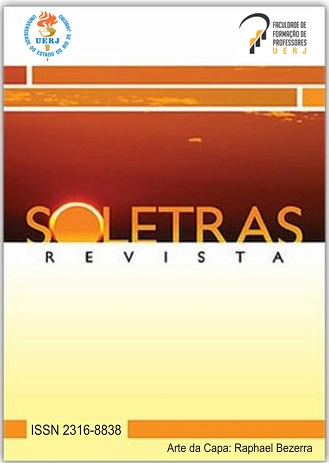Literaturas indígenas na escola: uma janela para desobediência epistêmica
DOI:
https://doi.org/10.12957/soletras.2024.83201Resumo
Neste texto buscamos refletir sobre as práticas pedagógicas tradicionais sobretudo aquelas que envolvem o ensino de línguas e literaturas na Educação Básica e sugerimos algumas possibilidades de desobediência epistêmica relacionada à inclusão e ao papel das literaturas de autoria indígena nas escolas brasileiras. Nosso objetivo é defender a presença das literaturas indígenas nas escolas como uma medida para valorizar essas narrativas e promover o movimento de aprender a desaprender. Defendemos atitudes pedagógicas que contribuem para a construção de uma sociedade que, ao desconstruir perspectivas coloniais, sejam capazes de desafiar as estruturas de conhecimento impostas pela colonialidade. Isso implica confirmar e valorizar saberes que ao longo da história foram marginalizados. A metodologia de pesquisa utilizada é do tipo documental e bibliográfica. Entre os teóricos que fundamentam esta pesquisa, destaco Krenak (2020), Munduruku (2016, 2017, 2020), Graúna (2013), Mignolo (2008, 2017b) e bell hooks (2017). A abordagem adotada enfatiza a necessidade de valorizar a diversidade cultural, e reconhecer a literatura como uma ferramenta de interação entre culturas e de troca de conhecimentos. Dentre os resultados salientamos a necessidade da inclusão das literaturas indígenas nas escolas e a capacitação de professores para promover debates e reflexões sobre a diversidade cultural e identitária. Reforçamos que a desobediência epistêmica é um meio possível para promover a justiça epistêmica e para questionar as estruturas de poder que perpetuam a desigualdade, contribuindo, assim, para uma educação mais inclusiva e igualitária.
Downloads
Publicado
Edição
Seção
Licença
A aprovação dos artigos implica a cessão imediata e sem ônus dos direitos de publicação nesta revista. O(s) autor(es) autoriza(m) ao Programa de Pós-graduação em Letras e Linguística (PPLIN) a reproduzi-lo e publicá-lo na revista SOLETRAS, entendendo-se os termos “reprodução” e “publicação” conforme definição do artigo 5° da Lei 9610/98. O(s) autor(es) continuará(rão) a ter os direitos autorais para publicações posteriores. O artigo poderá ser acessado pela rede mundial de computadores (http://www.e-publicacoes.uerj.br/index.php/soletras), sendo permitidas, a título gratuito, a consulta e a reprodução de exemplar do artigo para uso próprio de quem o consulta. Casos de plágio ou quaisquer ilegalidades nos textos apresentados são de inteira responsabilidade de seus autores.



